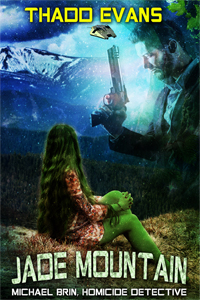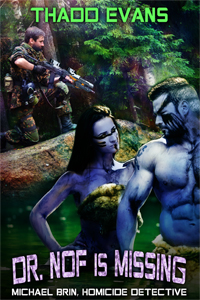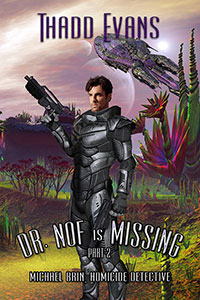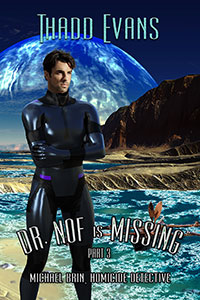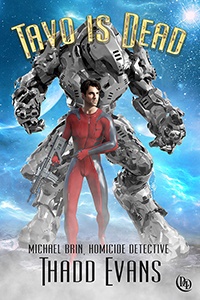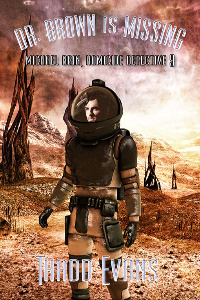In the distant future, not long after Dr. Grend arrived on a moon called Lo Pla trying to find a cure for cancer, she stopped sending 3D holographic messages to her employer, Physitan Corporation.
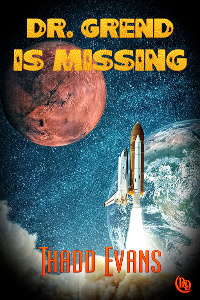
The starship I was on went into orbit around a space station. My supervisor’s face appeared in my contact lenses. He frowned at me. “Hello, Sir Tesk.”
“I have another assignment for you. Dr. Arlene Grend, a human, is missing. You must find her.”
“Why haven’t you sent LMP to locate her?” Locate Missing Persons robots were a new invention, and they were efficient.
“IT sent two of them nine days ago. An hour after landing on Lo Pla, the moon where Grend was searching for a cure for cancer, both of them stopped transmitting 3D holographic messages to EOD.”
I paused, surprised. The IT department manufactured quality robots. EOD, the Expedition Operations Department—a recently created branch of the police department—solved cases ninety-five percent of the time. “That’s horrible.”
A 3D hologram of Grend, a slender brunette with mocha skin, appeared in my lenses. Then the hologram rotated, making it easier to identify her. She was a biochemist with a small triangular birthmark on her right temple.
He scowled. “Exactly. EOD staff was shocked.”
“Why haven’t orbiting satellites spotted her?” 80 percent of the time these tools, ones that used albedo reflected light, found a person. If that didn’t work, they used microphones. If that equipment failed, the satellites utilized radio, visible infrared, and ultraviolet interferometric telescopes.
“It could be a combination of things. However, IT isn’t sure.”
I blinked, surprised that the staff at IT didn’t know.
“Your flight for Lo Pla leaves in two hours. The pilot’s name is Ael. When you reach this moon, a Qio humanoid named Difo will provide more information.”
“Eighty percent of Lo Pla is covered by three oceans, the Saot, the Oap and the Renn. Ninety percent of the population is Monn, a race of humanoid anglers. The Ina, a race of hunters, make up the remaining 10 percent. They live in the Yerk, a jungle in Besm, one of Lo Pla’s continents.”
“Exactly. Your love of research will help you solve this case.” Tesk’s face vanished, ending the call.
More information scrolled through my lenses. Eleven summers ago, in the year 4025, Dr. Brad Deeg, a botanist with a background in biochemistry, and three TRSR—transport supplies robots—started exploring the Yerk. Because of severe down drafts and strong winds, Deeg’s spacecraft had to land on one of Besm’s shores. If it didn’t it would crash.
Yerk was over eleven million square miles, and Deeg wanted to collect sixteen plants. According to an orbiting satellite’s laser Doppler scans, all sixteen were exotic orchids. They were a species unlike anything that any scientists had seen before and were located forty miles from the coast. Scans indicated that all sixteen were filled with a chemical that destroyed cancer cells.
After their spacecraft touched down on a beach, Deeg’s expedition hiked. Two evenings later they came upon a group of huts, dwellings that were located on the Yerk’s outer edge, nine miles from the coast. Within minutes, they met Kota. He was a member of the Ina race, who warned them about flesh-eating birds and lethal snakes.
Deeg thanked this stranger for the information and asked Kota if he would help guide their expedition. Kota hesitated. After Deeg gave him food rations along with a machete, Kota agreed to help him locate the orchids.
Three days later, Deeg and his search party along with Kota vanished without a trace. Deeg’s last 3D holographic messages mentioned loud birdcalls and vague information. All the messages were sent to Marn University’s Biochemistry department—his employer—three hours before every member of the expedition disappeared.
In 4029, Dr. Garland Smith, a botanist who was impressed by Deeg’s discovery, hiked for miles to find the orchids. Smith was accompanied by two utility robots (URs) that carried his supplies. After cutting their way through dense jungle for hours, they located a group of huts that were sixty miles north of those that Deeg had found. An Ina male stepped out of one and said his name was Notar.
During a conversation, Smith asked Notar if he would help him find the exotic orchids. Notar hesitated, then told him that carnivorous ants and deadly lizards roamed the area that surrounded the flowers. Smith gave him exotic liquor, knives, and a hand-held laser—a tool that made it easier for Notar to cut a path through dense jungle. Notar accepted the gifts and said he would help Smith locate the exotic plants.
The next morning they left. Six hours later, Smith stopped transmitting 3D holographic messages to Camin University’s Botany department, the organization that financed and set up his expedition. Dr. Qenx and Dr. Oret, his colleagues in the department, never heard from Smith or any member of his expedition again.
Within five days, Qenx and Oret held a meeting. Near the end of it, everybody who was present agreed that their Botany department didn’t have enough money to send a rescue party to Yerk.
In 4033, Dr. Ray Johnson, a botanist at Camin who was also impressed by Deeg’s discovery, organized another expedition. Johnson felt he could locate the orchids because he had five UR V’s—updated androids.
After hiking next to a stream for hours, Camin’s expedition located huts that were five miles north of those Smith found. Soon Johnson met Ao Ta, an Ina, and told him about the orchids. Ao Ta warned him about six-foot tall flesh eating birds and gigantic snakes. Johnson gave him an SRK, a skin repair kit. Ao Ta demanded to know what the SRK was used for. Johnson cut his own finger, then smeared a trace amount of the substance on the wound. It healed in seconds. Ao Ta said he would help Johnson find the orchids.

